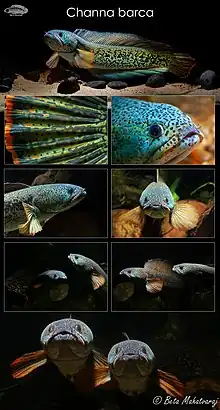Barca snakehead
The Barca snakehead (Channa barca) is a rare species of snakehead. It is endemic to the upper Brahmaputra river basin in northeastern India and Bangladesh.[2][3] Records from Nepal are of doubtful validity.[1] Overall it has been assessed as data deficient by the IUCN,[1] and in 2014 it was assessed as critically endangered in Bangladesh by the IUCN.[3] In Assam, it is locally known as cheng garaka or garaka cheng.
| Barca snakehead | |
|---|---|
.jpg.webp) | |
| Scientific classification | |
| Domain: | Eukaryota |
| Kingdom: | Animalia |
| Phylum: | Chordata |
| Class: | Actinopterygii |
| Order: | Anabantiformes |
| Family: | Channidae |
| Genus: | Channa |
| Species: | C. barca |
| Binomial name | |
| Channa barca (F. Hamilton, 1822) | |
| Synonyms[2] | |
| |

This is a relatively large snakehead, reaching a total length of up to 105 cm (3.4 ft).[2] The species is regarded as an excellent food fish,[2] and it is also highly desired by aquarists, but its rarity, behavior and large size makes it unsuitable for most aquariums.[4]
Distribution, habitat and behavior
The barca snakehead is only known from the upper Brahmaputra river basin the Assam and Nagaland in India,[1] and Sylhet in Bangladesh.[3] Records from Nepal are of doubtful validity.[1] It mostly inhabits wetlands, often near the margins, but can also be seen in riverine habitats.[5][6] It is able to withstand large variations in water temperature and oxygen levels as its habitat experiences large seasonal changes in flood levels.[5] It often inhabits a vertical tunnel that typically is around one metre (3.3 ft) long and goes down to the water table. The tunnel ends in a chamber where the fish may spend the dry season when the wetlands above it disappear.[4] Some other snakeheads that inhabit the same general region as the barca snakehead have also been reported to "hibernate" during the dry season, including the closely related orange-spotted snakehead (C. aurantimaculata).[7] The overall conservation status of the barca snakehead is poorly known, but it appears to generally be a scarce or rare species.[1][4]
The species is highly carnivorous,[8] feeding mostly on fish.[5] Little is known about the breeding behavior, but like its nearest relatives it is likely a mouthbrooder.[4] Maturity may occur when only 12.5 cm (5 in) long, but most individuals are around two or three times that size before they reach it.[5] The breeding season is prolonged and begins when the beels they inhabit are flooded by pre-monsoonal rain in April–May. The species has a low fecundity and both parents take care of the young.[5]
References
- Chaudhry, S. (2010). "Channa barca". IUCN Red List of Threatened Species. 2010: e.T166596A6244166. doi:10.2305/IUCN.UK.2010-4.RLTS.T166596A6244166.en. Retrieved 19 November 2021.
- Froese, Rainer; Pauly, Daniel (eds.) (2019). "Channa barca" in FishBase. February 2019 version.
- "Details - Updating Species Red List of Bangladesh". www.iucnredlistbd.org. Retrieved 6 January 2018.
- SeriouslyFish: Channa barca. Retrieved 14 February 2019.
- Choudhury, M., and S.P. Biswas (2003). Maturity and spawning habit of an ornamental snakehead fish Channa barca (Hamilton). J. Ecophysiol. Occup. Hlth. 3: 149-152.
- Goswami, M.M., B. Arunav, and P. Janardan (2006). Comparative biometry, habitat structure and distribution of endemic snakehead (Teleostei: Channidae) species of Assam, India. Journal of the Inland Fisheries Society of India 38(1): 1-8.
- Gogoi, N., L.P. Hazarika and S.P. Biswas (2016). Studies on the reproductive biology and captive breeding of an endemic fish from Assam Channa aurantimaculata. Journal of Environmental Biology 37: 369-374. doi:10.13140/RG.2.1.1548.3763
- Rahman, A.K. Ataur (2005). Freshwater fishes of Bangladesh. Dhaka, Bangladesh: Zoological Society of Bangladesh, Department of Zoology, University of Dhaka.
External links
- "Channa barca". Integrated Taxonomic Information System. Retrieved 18 April 2006.
